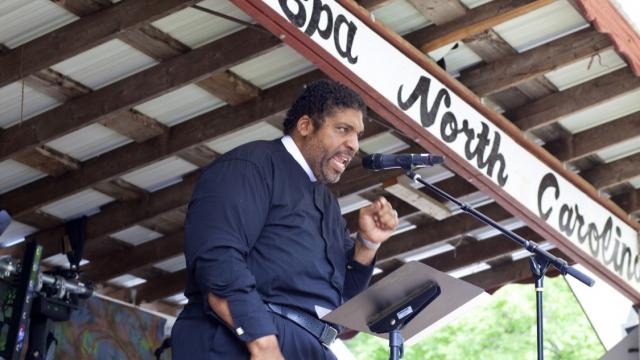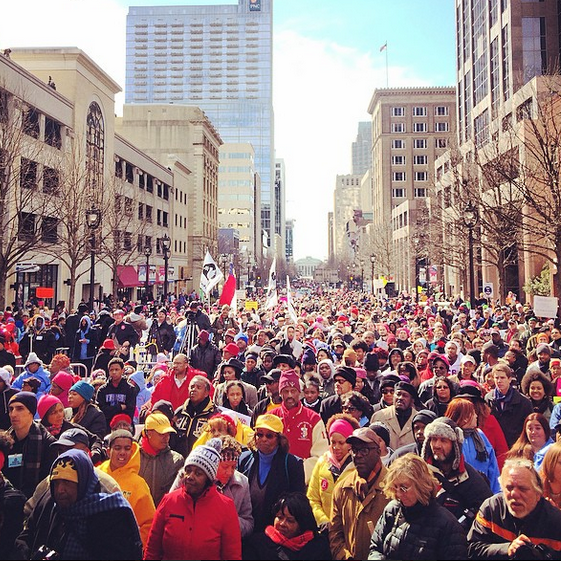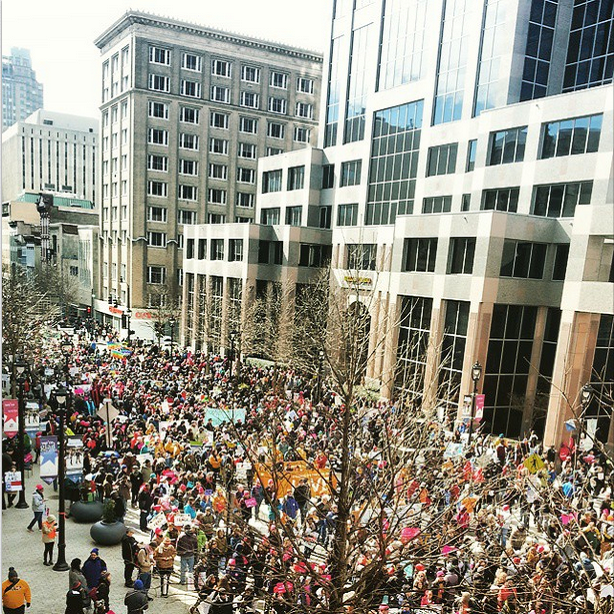
This is the first installment in a three-part series on Reverend Barber and the Forward Together movement in North Carolina.
On Feb. 14, roughly 30,000 people got up early on a cold Saturday morning to march on the North Carolina state house in Raleigh to demand anti-poverty legislation, voting rights, healthcare access, LGBT rights, environmental justice, criminal justice reform, and reproductive rights. #MoralMarch, the official hashtag of the protest, was a top national trend on Twitter, and an image of the march posted on the US Uncut Facebook page was shared over 12,000 times and reached almost 1.5 million people. (Full disclosure: I’m one of the admins for US Uncut.)
Meanwhile, the lead story in the next day's Raleigh News & Observer, complete with a spread of 97 photos, was about a five-mile run in which participants ate a dozen Krispy Kreme donuts halfway through. Anchors of corporate-owned local TV news stations each spent 40 seconds talking over video of the march, briefly mentioning that it happened, and the News & Observer later gave the march a brief two-sentence summary on its website. So what is it about the Forward Together movement the media is so scared to talk about?
As Reverend Dr. William Barber, president of the North Carolina NAACP and voice of the Forward Together movement, calls it a “deeply constitutional, deeply moral” battle against the worst forms of injustice, led by young people, minorities, and people of multiple faiths – the exact groups the current political regime is working to disenfranchise.
“The attacks are happening out of fear. They’re not attacking us because we’re weak,” Barber said during an extensive interview at his hotel. “They’re attacking us because when that demographic forms, we can fulfill the hope of Dr. King and form that demographic bloc that can shift the politics in the South. And if you can shift the South, you can shift the whole nation. After the election of Barack Obama, that demographic formed in places like North Carolina, Virginia, Florida and South Carolina. And the extremists saw that, and they said, 'we’ve gotta stop this.'”
The Forward Together movement is officially known as the Historic Thousands on Jones Street (HKonJ) coalition, made up of 170 member organizations spanning multiple issues. HKonJ unites these groups under a 14-point agenda emphasizing an intersectional approach including: high-quality public education, living wages, healthcare for all, racial justice, voting rights, affordable higher education, fairness for state contracting, affordable housing, criminal justice reform, environmental justice, collective bargaining and worker safety, immigrants’ rights, a new civil rights act, and bringing the troops home. Rev. Barber encourages other movements to adopt a similar approach and focus on pressuring state legislatures and governors, not Washington politicians.
“Most of the threats in this country are coming from the statehouses. It isn’t coming from Congress. Congress isn’t passing anything,” Rev. Barber said.
With the financing of billionaire retail emperor Art Pope, extreme right-wing Republican politicians took a majority in the legislature in 2010 – the first post-Citizens United election in which multiple campaign finance laws were eradicated. In 2012, Pope funded Pat McCrory’s successful campaign for governor, cementing the first Republican supermajority in North Carolina in over a century.
“I call them extremists, I don’t call them Republicans,” Rev. Barber said. “I know good Republicans, and these people aren’t it… This extremist, Koch brother, tea party ideology is dangerous for the future.”
McCrory reciprocated by making Pope his administration’s budget director, and not long after, budgets for schools, healthcare, housing, environmental regulation, unemployment compensation, and social safety nets for the impoverished were slashed in favor of generous new corporate tax breaks for big businesses like Pope’s. Governor McCrory refused to expand Medicaid under the Affordable Care Act, which effectively signed the death warrants of anywhere between 400 to 1,100 North Carolinians, according to a Harvard study.
North Carolina also passed one of the nation’s most draconian voter suppression laws, which limited early voting, ended same-day voter registration, and included strict requirements on what kind of photo ID is acceptable for voter registration (student photo ID is not accepted). The North Carolina NAACP has since filed a lawsuit against the State of North Carolina in federal court challenging the restrictions on voting. The group won an injunction in the 4th circuit and is taking the case to trial on July 6.
“Extremists, in their hubris, they won’t back off. They keep making mistakes. They’re trying to stop a future from coming that they cannot stop,” Barber said.
“You’re attacking the dreams of these children’s grandparents, and they understand that. When you roll back voting rights, you’re telling these children, ‘We’re gonna dishonor your grandmama and your mama,’ and you just don’t do that.”
In comment threads on News & Observer articles, the Forward Together movement’s detractors claim that despite constant protests, Republicans won the U.S. Senate election in North Carolina last November. However, Rev. Barber pointed out that despite all of the restrictions on voting, two traditionally red counties – Hyde County and Jackson County – turned blue last election for the first time since 2008, and that Republican Thom Tillis only beat Democrat Kay Hagan by 1.7 percent.
“We’re changing the politics of the state,” Barber continued. “We’re challenging our legislators and governor to be true to the constitution and true moral values – not to put their hand on the bible, swear to uphold the constitution, then violate the basic principles of both.”
The facts back up Rev. Barber’s case. Multiple surveys conducted by Public Policy Polling found that a majority of North Carolinians (54 percent) think giving teachers a raise should be a bigger priority than cutting taxes. Fifty-five percent of North Carolinians thought that those teacher raises should come from increasing taxes on people making more than $250,000 a year as opposed to the state senate’s proposal of cutting teachers’ assistants. Gov. McCrory’s approval rating was once at 50 percent, but dipped as low as 39 percent. The Republican legislature had polled as high as 40 percent, but after the consistent protests at the capitol, they polled as low as 18 percent.
“It wasn’t that way when we started. But the movement has shifted the culture. And we hope that more of those who are against us will continue to turn,” Rev. Barber said. “Lyndon Baines Johnson didn’t want to pass the Voting Rights Act, but Dr. King and the NAACP shifted the consciousness of the nation and made him do it.”
Stay tuned for part II of this series, which compares the organizing efforts of Martin Luther King Jr. and the Civil Rights movement of the 1960s to the organizing efforts of Reverend Barber and the Forward Together movement today.
3 WAYS TO SHOW YOUR SUPPORT
- Log in to post comments













